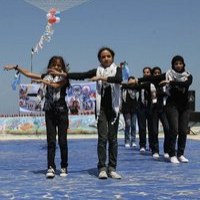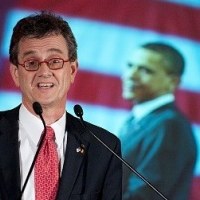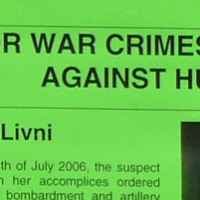![]()
New York City, 25th September, 2013
Herman Van Rompuy
President of the European Council
Speech to the General Assembly of the United Nations
68th session
A year ago when we met in this General Assembly, we joined our voices to deplore that the Syrian civil war had claimed over twenty five thousand lives. One year on, it has killed over a hundred thousand men, women and children.
The number of refugees, from two hundred and fifty thousand last September, doubled by December, then doubled again by March, and then it doubled again. Today, there are two million Syrians outside their country, half of them children, and under current trends, close to doubling again, there may be three and a half million refugees before the year is over.
We cannot let this spiral of criminal, sectarian violence pursue its dreadful course at the heart of the world’s most unstable region. What will the situation be, when we meet again next year?
Any further paralysis of the international community over Syria is simply untenable. It was already true this summer, but worse was yet to come … Five weeks ago, in the outskirts of Damascus, a new threshold of tragedy, a crime against humanity; and in response the stakes were raised.
Today we are in a new situation. The European Union welcomes the diplomatic opening created in order to control and destroy Syria’s chemical weapons.
It is important in itself: we absolutely must avoid a dreadful precedent being set on the use of chemical weapons — an abhorrent crime against humanity. The role of the United Nations in this respect is indispensable, and has been underscored time and again by the 28 governments of the European Union.
After the UN Secretary General’s report and the inventory of its arsenal provided by the Syrian regime, it is urgent for the Security Council, together with the Organisation for the Prohibition of Chemical Weapons, to take the necessary decisions to ensure the swift and secure destruction of Syria’s poison gas and nerve agents stocks.
A clear resolution by the Security Council would mark a turn, and I plea for its adoption.
Eliminating Syria’s chemical arsenal is in itself a major step. Potentially it could also be important for the wider dynamics in the region. Clearly, the conflict wrecking Syria reflects many of the deepseated tensions rippling throughout the Middle East. It is fed by these tensions, and fuels them as well. So a solution for Syria will need to take into account the wider picture.
That is why any political opening matters deeply: a breakthrough on chemical weapons could start opening other doors. In the black wall of Syria’s doom, it will be a first crack. Paradoxically, there is more scope for quiet hope today than even a few weeks ago.
Because if commitments can be upheld and promises kept on chemical weapons, if lines of communication can reopen, if we can find an agreement within the international community (and at the Security Council) … if we can do all this on chemical weapons, then chances are we can do it elsewhere.
There must be ways to open up opportunities. But when new opportunities arise, we must seize them .. Only then will we see the outlook improve for Syria. Now is indeed the moment to work actively towards “Geneva II”.
As international community, we must fully engage, with all available diplomatic means. The first priority is to bring all parties to the negotiating table. Those close to Damascus, and those close to the Syrian Opposition must do all within their power to draw each side to the table. The European Union is ready to provide all support needed to achieve a political settlement.
And elsewhere in the region too, new opportunities must and can be seized.
Not least in the Middle East Peace Process, where prospects for progress look better than they have for some time. All parties are returning to the negotiating table, with renewed seriousness. For the European Union the parameters are clear: Palestine and Israel must be able to fulfil their legitimate aspirations; two states living side by side in peace and security. Now both parties must seize the moment.
We also hope the expectations currently building around the new Iranian leadership will translate into concrete steps. In the interest of regional stability. And for the nuclear talks, where all efforts to find a negotiated solution, through the work of the “E3+3” led by EU High Representative
Catherine Ashton, have the European Union’s full support.
Both these developments, with Israel and Palestine, with Iran, can be mutually reinforcing with what is currently happening around Syria; there all must be done to forge the path to a political solution.
Ladies and gentlemen, once “Geneva II” starts, we have to be honest with ourselves: it will not be easy — ending a war never is. It will require political will, and a real sense of compromise. But we must recognise that the cost of hesitating, of not engaging, would be much higher — and not only for the people of Syria.
Every day counts. With every day of unforgivable violence, bitterness and trauma go deeper, radicalisation and warlordism gain ground, hatred and despair win. Every day, reconciliation in Syria, and around Syria, becomes harder.
We in Europe, we know that reconciliation is the hardest thing. The countries on our continent only agreed to live peacefully together after many wars, and many civil wars, with huge numbers of victims — a price we never want others to have to pay. And we know reconciliation is even harder inside a country than between countries. No longer waging war is one thing, living again together quite another.
Syria, as a country, as a nation, is being destroyed beyond recognition. It will take time, courage and perseverance to build an inclusive, united, democratic Syria, where all Syrians can feel they belong and where all share a common future regardless of their identity, regardless of their religion.
The promise of the Arab Spring must be met in Syria too — just as it must in Egypt and beyond. At heart, it is a shared yearning for democracy, for tolerance, for social justice — a powerful message in which we still believe.
But on this long path, the Syrians will need all the help they can get, just as others before, including we in Europe, received support, when mending their nations. The United Nations can play an important role in helping the country re-establish unity. And in helping Syria eventually find justice, ensuring there is no impunity, and that individual perpetrators of war crimes are held accountable.
We Europeans are ready to play our part in helping Syria rebuild its nation. Just as we are engaged, today, on the ground in the humanitarian effort in Syria and in the countries to which refugees have flown — not least in Lebanon and Jordan, where the situation is extremely worrying. Our countries and institutions are working closely with the UN High Commissioner for Refugees to bring food, protection and shelter, as well as medical help and education. By far the biggest aid provider for Syria, jointly we have already provided 1,8 billion euro (or 2,4 billion US dollar), and we know more will be needed.
Europe is not disengaging, even despite the economic difficulties that the past years have brought.
The global financial crisis, that started in this very city five years ago, shook Europe and brought forth global imbalances that we have worked hard to address.
We are putting our house in order, and expect others to do so too. Correcting internal imbalances and pursuing structural reforms is needed in countries all across the globe.
For us, the results are starting to show: today the eurozone is financially in better shape than twelve months ago. The existential threat to the euro area is over and we are now fully focusing on improving prospects for employment and growth.
We have launched deep efforts, focused on the long term. It takes time before results show, in terms of strong economic growth and jobs, but once they start to do so, as they are now, they will be more lasting. Next year, economic growth is projected for all but one of our 28 countries.
Our political will to preserve Europe’s unity cannot be underestimated. We have shown it these past five years. For ultimately, it is a political project that unites us — to bring together countries, to bring together people.
Hope is in our hands. Merci, thank you.



 RSS
RSS











Latest Comments
Hello Mike, Thank you for your positive feedback to the article. I felt there wasn’t too much critical analysis of ...
Thanks for this considered and well constructed article. A follow up article on the manner in which the editorial contro...
THE CLUELESSNESS OF CLAIMING THAT OBAMA'S MIDDLE EAST POLICIES WERE A FAILURE CANNOT BE FURTHER FROM THE TRUTH, WHAT THE...
As long as Obama is the president of the usa do not trust the us government......
Thank you for an good read....